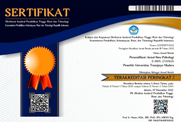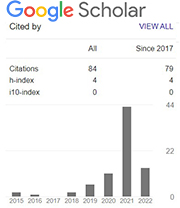Hubungan Character Strength Mahasiswa Dengan Preferensi Kepribadian Dosen Fakultas Ushuluddin dan DakwahH IAIN Kediri
Abstract
Keywords
Full Text:
PDF (Bahasa Indonesia)References
Abdullah, I., Omar, R., & Rashid, Y. (2013). Effect of personality on organizational commitment and employees’ performance: Empirical evidence from banking sector of Pakistan. Middle-East Journal of Scientific Research, 18(6), 759–766.
Akhmad, H., Muhammad, A., & Suciani, L. (2022). Peningkatan karakter temperance mahasiswa melalui konseling spiritual teistik. Jurnal Konseling Andi Matappa, 6(1), 38–45.
Ardiana, I. D. K. R., Ramadhani, H. S., Jodi, S., & Ali, H. F. (2022). Mapping the quality of HR through the approach strength of character in supporting the potential of religious tourism village in Gresik Regency, East Java. Ekspektra: Jurnal Bisnis Dan Manajemen, 6(2), 72–84. https://doi.org/10.25139/ekt.v6i2.5144
Costa, P. T., & McCrae, R. R. (2008). The Revised NEO Personality Inventory (NEO-PI-R). In The SAGE Handbook of Personality Theory and Assessment: Volume 2 — Personality Measurement and Testing (pp. 179–198). SAGE Publications Ltd. https://doi.org/10.4135/9781849200479.n9
Duan, W., Huang, K., & Zhou, H. (2024). Character strength–based interventions in educational settings. In The Routledge International Handbook of Life and Values Education in Asia (pp. 352–359). Routledge. https://doi.org/10.4324/9781003352471-45
Garcia, R. S., Patel, K. P., & Anderson, E. (2020). The influence of student humanity on instructor personality preferences: An analysis of higher education settings. Educational Psychology Review, 2(1), 123–141.
Garvin, G. (2020). Penyusunan alat ukur character strength Bahasa Indonesia. PSYCHE: Jurnal Psikologi, 2(2), 28–48. https://doi.org/10.36269/psyche.v2i2.238
Hidayat, W. S. P., & Hastuti, D. (2022). Is the role of father’s parenting important for the character building of students? Journal of Child, Family, and Consumer Studies, 1(2), 71–80. https://doi.org/10.29244/jcfcs.1.2.71-80
Johnson, S. E., & Brown, L. A. (2019). Exploring the compatibility of student courage with instructor personality traits: Implications for learning environments. Journal of Higher Education, 4(2), 706–729.
Kuswanto, D. (2012). Statistik untuk orang awam dan pemula. Laskar Aksara.
Maryama, H. (2015). Pengaruh character strengths dan gender terhadap stres akademik mahasiswa UIN Jakarta yang kuliah sambil bekerja [Skripsi]. Universitas Islam Negeri Syarif Hidayatullah.
McCullough, M. E., & Snyder, C. R. (2000). Classical sources of human strength: Revisiting an old home and building a new one. Journal of Social and Clinical Psychology, 19(1), 1–10. https://doi.org/10.1521/jscp.2000.19.1.1
Multahada, E. (2016). Peran kekuatan karakter terhadap resiliensi perawat (studi kasus pada perawat di rumah sakit X). Jurnal Ilmu Ekonomi Dan Sosial, 5(3), 275–279.
Najiah, S., Ninin, R. H., & Lubis, F. Y. (2023). Strength of character in teachers of children with special needs. Jurnal Indonesia Sosial Teknologi, 4(8), 1086–1098. https://doi.org/10.59141/jist.v4i8.685
Neta, A. L., Putri, A. N., & Murdy, K. (2021). Hubungan kepribadian dosen terhadap Kepuasan mahasiswa dalam proses belajar pembelajaran STKIP Aisyiyah Riau. Jurnal Agregat: Journal of Economic Education And Economics Business, 2(2), 11–18.
Nurfalah, F., Maya, L., & Widiyanti. (2011). Pengaruh kredibilitas dan kepribadian dosen dalam mengajar terhadap motivasi belajar mahasiswa jurusan Komunikasi Penyiaran Islam Fakultas Dakwah Institut Agama Islam Negeri Syekh Nurjati Cirebon. Jurnal Komunikasi Pembangunan, 9(2).
Park, N., & Peterson, C. (2009). Character strengths: Research and practice. Journal of College and Character, 10(4). https://doi.org/10.2202/1940-1639.1042
Permatasari, F., & Arianto, Y. (2022). Urgensi kompetensi kepribadian guru sebagai upaya pengembangan karakter siswa. IDEA: Jurnal Psikologi, 6(1), 76–82. https://doi.org/10.32492/idea.v6i1.748
Prasetyo, A. R., & Ratnaningsih, I. Z. (2019). Pelatihan career happiness plan untuk meningkatkan kekuatan karakter (virtue) sebagai modal kerja pada mahasiswa. Jurnal Psikologi, 18(2), 187. https://doi.org/10.14710/jp.18.2.187-198
Rahmah, S., & Fadhli, M. (2021). Character education in Islamic education institutions: A study on the impact of lecturer competence at IAIN Lhokseumawe. MIQOT: Jurnal Ilmu-Ilmu Keislaman, 45(1), 87. https://doi.org/10.30821/miqot.v45i1.771
Salju, S., & Anwar, S. M. (2019). Melentingkan kinerja dosen di era digital melalui motivasi, kepribadian, dan kepemimpinan. CV. AA Rizky.
Smith, J. R., Davis, A. L., & Johnson, M. P. (2018). The relationship between student characteristics and instructor personality preferences in higher education. Journal of Educational Psychology, 3(2), 482–498.
Sugiyono. (2018). Metode penelitian kuantitatif. Alfabeta.
Suhandiah, S., Ayuningtyas, A., & Oktaviani, O. (2018). The effect of big five personality on lectures and employee’s performance. International Conference on Information Technology Applications and Systems (ICITAS).
Sulastra, M. C., & Handayani, V. (2020). Pengasuhan berbasis kekuatan karakter dan keterlibatan diri pada mahasiswa. Philanthropy: Journal of Psychology, 4(2), 143. https://doi.org/10.26623/philanthropy.v4i2.2188
DOI: https://doi.org/10.21107/personifikasi.v16i1.23290
Refbacks
- There are currently no refbacks.
Copyright (c) 2025 Fatma Puri Sayekti

This work is licensed under a Creative Commons Attribution 4.0 International License.


Personifikasi by Universitas Trunojoyo Madura is licensed under a Creative Commons Attribution 4.0 International License.










